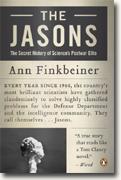The Jasons
Ann Finkbeiner
book reviews:
· general fiction
· chick lit/romance
· sci-fi/fantasy
· graphic novels
· nonfiction
· audio books
· author interviews
· children's books @
curledupkids.com
· DVD reviews @
curledupdvd.com
newsletter
win books
buy online
links
home
for authors
& publishers
for reviewers

 |
The Jasons: The Secret History of Science's Postwar Elite Ann Finkbeiner Penguin Paperback 336 pages March 2007 |
|
Ann Finkbeiner is a science writer who overheard a comment about Jason. Asking "Who are these guys?" resulted in the research for this book.
These were the top theoretical physicists who found it stimulating and fun to work on more practical, technical problems. Jasons are patriotic individuals who joined this group to advise the government on scientific issues. They didn't immediately understand that they had no control over their ideas/inventions once they handed them over to the government, and that those ideas/inventions may have a use they did not foresee and would come to regret. These were theoretical physicists who, in their careers, were removed from the moral implications of their ideas in practice. Now, as they were involved in applied physics, they needed to come to grips with these moral issues. For some, it came down to carefully choosing which projects they'd work on. In the beginning, all the Jasons had equal (top) security clearance, and it was each individual's choice whether to work on classified or unclassified studies. Unclassified studies could be shared with staff and students; there's no need to be ever mindful of remaining tight-lipped. Classified studies have a smaller cadre of researchers who are more in need of peer review than researchers in studies that are open to a wider community for review. Post-Vietnam era government has become less interested in independent scientific advice. The federal government is leaning toward in-house advice from people on the payroll who know the politically-correct advice to give. The Cold War made the choice of studies easy: missile defense and nuclear test bans. Where do the Jasons fit in? They've recruited new members from sciences outside physics and have studied other fields, like global warming and gene sequencing. The prerequisite for membership remains the same: breadth of interest and interdisciplinary curiosity. Like species that need to adapt to a changing environment, Jason faces challenges as work and home environments have undergone change. Families no longer consist of a working father and a stay-at-home mother. With both spouses working, the ability to move entire families for six-week seminar camps is hampered. Face time, brainstorming and interdisciplinary input are diminished. The playtime that often spurs creativity is lost as individuals commute between seminars and families back home. Can Jason survive? Jason has lasted this long because, as Jason Freeman Dyson said: "It is delightful to work on a project where the aim is to get a job done rather than to get the credit for it. Most of us function best when working in a group, especially when the group is bonded with friendship. Most people are happiest cooperating than competing." This is the work environment we all dream of having. It is worth trying everything to preserve it. Also, it is good to have a group outside of government review the validity of information used in policy-making. The author has discussed the history and work of an organization much of whose body of work remains classified and many members have also remained secret. This may be the documentation of the Camelot years of Jason. Originally published on Curled Up With A Good Book at www.curledup.com. © Midge Bork, 2007 |
|
|
|
 Click here to learn more about this month's sponsor! |
|
| fiction · sf/f · comic books · nonfiction · audio newsletter · free book contest · buy books online review index · links · · authors & publishers reviewers |
|
| site by ELBO Computing Resources, Inc. | |
 In 1960, Jason assembled to do "imaginative thinking about military problems." It started with about thirty physicists, students of the physicists who had made up the Manhattan Project and the Matterhorn Project. One physicist remarked at a Jason meeting that it looked "like the Who's Who of American Physics." With probably justifiable "physics arrogance," these individuals saw themselves as the best choice to work on scientific issues for the government (specifically the Department of Defense). They see physics as the most fundamental science, and they were the most brilliant physicists in the country. They gathered each summer for six weeks of seminars, brainstorming and barbecues. They knew each other from academia and liked each other.
In 1960, Jason assembled to do "imaginative thinking about military problems." It started with about thirty physicists, students of the physicists who had made up the Manhattan Project and the Matterhorn Project. One physicist remarked at a Jason meeting that it looked "like the Who's Who of American Physics." With probably justifiable "physics arrogance," these individuals saw themselves as the best choice to work on scientific issues for the government (specifically the Department of Defense). They see physics as the most fundamental science, and they were the most brilliant physicists in the country. They gathered each summer for six weeks of seminars, brainstorming and barbecues. They knew each other from academia and liked each other.